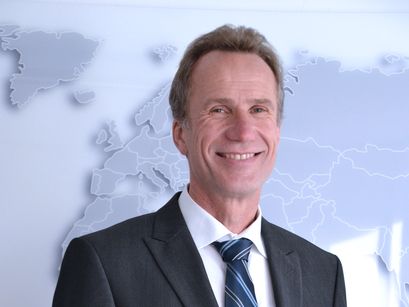Personal relationships for the long term success
Despite its size, Minitube is a family business where personal relationships are very important. Let us introduce you to the Managing Director, Dr. Christian Simmet, in an interview.
Dr. Simmet, can you briefly tell us how Minitube formed 51 years ago?
My father received his veterinary doctorate in 1953 and subsequently became a specialist veterinarian for breeding hygiene and artificial insemination. Thus, he was one among few specialists in animal reproductive medicine at that time. The portioning and preservation of bull semen for insemination was still in its infancy at this point and the laborious manual work was not very suitable for large-scale application. Besides his work as a rural veterinarian, his enthusiasm for assisted reproduction and its future potential motivated my father from the very beginning to get involved in cattle artificial insemination. Finally, it became his main profession in an artificial insemination station near Landshut from 1964. Based on his technical skills and professional background, he developed the patented plastic semen straw with sealing ball and the world's first automatic filling and sealing machine in 1968. This technology laid a foundation for the routine use of artificial insemination in animals. Two years later, my parents founded Minitüb GmbH. The company was named after the core element of the new technology, the "small tube".
So, Minitube started as a family business, and it still is today with a third family generation starting to work in management. Many parents want their children to share their interests, no matter if hobby or profession. Is there a secret to achieving this without pressure?
There is certainly no patent remedy for this. However, if the parents can convey their fascination for the subject, enjoy their work themselves and if the family business has good or even excellent prospects for the future, you have good conditions for getting the next generation excited about the company.
Over the past 20 years, Minitube has developed into a market-leading position and is a full-range supplier to modern animal reproduction. What are the most important prerequisites for such a success story?
Success factor number one is committed and satisfied employees. They are our greatest asset. I consider one of the most important management tasks is to offer them an environment where they can contribute their strengths and creativity and thus feel good in the long term. The fact that we are on the right track was confirmed, for example, when we were named one of the 20 most family-friendly companies in Bavaria in 2018.
In addition, you should maintain a healthy ambition for your area of expertise: resting in complacency is the first step towards decline. To me, an achievement is always a reason to celebrate, but also the incentive to think about the next step and about improvements. That brings me to a third point, foresight: we always plan for the long term and have a vision of where the company should be in 10 or 15 years.
Minitube has an outstanding potential for future development within livestock breeding. Why did you decide to break new ground by opening the "Human Division"?
MTG did a great job in terms of establishing our products in reproductive medicine, many IVF centers worldwide are using them on a daily basis. For this reason alone, we saw the need to ensure continuity for customers and to establish and expand the sales network.
Apart from that, I am confident that we will continue to be a beneficial manufacturer and supplier for reproductive medicine: we have great expertise not only in plastics processing, but also in the areas of equipment engineering and software, backed up by a very well positioned R&D department. We are currently in the process of registering our products according to the standards of the new Medical Device Regulation and see great opportunities for companies with a quality focus and high competence. I also see areas and needs where we will be involved with new products in the medium term.
Last but not least, a third-generation family business thinks long-term, as I already pointed out. The field of reproductive medicine will grow sustainably and is an excellent option for Minitube to broaden our base. Animal breeding will change in the coming years and decades. There will probably be fewer livestock, but animal breeders will increasingly rely on advanced technology and laboratory automation in semen production and embryo transfer to be able to implement new breeding goals aiming at sustainability and animal health. We are, of course, prepared for this. On top of that, we are also interested in widening our focus with respect to corporate success.
By now you have gained a good overview of reproductive medicine. Opening the new "Human Division" - which feeling prevails for you: a familiar world or completely new grounds?
To a certain extent, the standards based on the new European Medical Device Regulation are new territory for us - there is no comparable requirements in the livestock breeding sector. However, all medical device manufacturers have to face this new challenge; ultimately, it is a contribution to product quality.
I am quite familiar with the processes, techniques and, of course, the physiological principles of assisted reproduction; there are many parallels between humans and animals. When discussing the business relation with our customers: in animal breeding, we don't thrive on quick business, but build on long-term, personal relationship - it's give-and-take at eye level. For improving and developing our products, the expertise, needs and technical input of routine users are very important to us. As a company, we would like to establish and maintain this culture towards our customers in human medicine as well.
Picture 1: The Minitube executive board (from left to right): Christa Simmet (Chief Commercial Officer), Katharina Rohrmüller (Chief Financial Officer), Dr. Christian Simmet (Chief Executive Officer), Rudolf Simmet (Chief Procurement Officer)
Picture 2: Staff of the Minitube Head Office in Tiefenbach/Germany
Picture 3: The company founder Dr. Ludwig Simmet and his wife Irmingard Simmet


